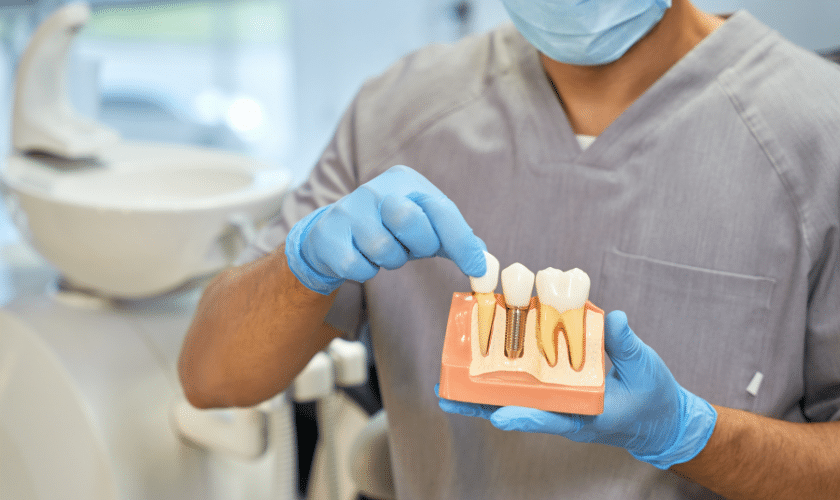If you’ve ever worried about a damaged or weakened tooth, chances are you’ve heard of dental crowns. These tooth-shaped “caps” are not just cosmetic enhancers; they’re pivotal in restoring a tooth’s shape, size, strength, and overall appearance. Let’s take a deeper look into the intricacies of dental crowns, from the costs to maintenance, helping you understand why they might be the tooth-saving solution you’re looking for.
What Are Dental Crowns?
Dental crowns are custom-made caps placed over a tooth to cover and protect it from incurring any further damage. Dentists recommend crowns for various reasons, whether to enhance the tooth’s appearance or to fortify its structure following decay, injury, or after a significant filling. Unlike removable devices like dentures, crowns are cemented onto existing teeth or implants, offering a semi-permanent solution to many dental issues. They can be made from various materials, including ceramics, porcelain, resin, and metals, each bringing unique benefits to the table depending on the patient’s needs and aesthetic preferences.
Navigating the Costs of Dental Crowns
Understanding dental crown costs is crucial for anyone considering this dental solution. Prices can vary significantly based on material choice, geographical location, as well as the complexity of the installation. Porcelain crowns tend to be more popular due to their natural appearance and durability, but they can also be more expensive compared to resin or metal options. The cost may increase if other dental procedures, like root canals or implants, are needed before placing the crown. Insurance can play a big role in managing these expenses, as many plans cover part of the cost of crowns, especially when deemed medically necessary. Patients should discuss with their dental professionals and insurance providers to get a clear picture of the financial commitment and explore all possible options to make educated and informed decisions without compromising on quality.
The Procedure: What to Expect When Getting a Dental Crown
The process of getting a dental crown usually involves several different steps, starting with a consultation. During your initial visit, your dentist will assess the health of your tooth and decide if a crown is the best option. If it is, the tooth in question will be reshaped to prepare for the crown. This might involve filing down the tooth or building it up with a filling material to ensure the crown fits securely. An impression of your tooth will then be taken and sent to a dental lab, where your crown will be made. This process can take a couple of weeks, during which you might wear a temporary crown to protect the tooth. When your permanent crown is ready, you’ll go back to the dentist’s office for fitting, adjustments, and, finally, cementing the crown into place, restoring your smile’s functionality and appearance.
How to Care for Your Dental Crown
Maintaining a dental crown is not drastically different from caring for your natural teeth, but it does require some attention to ensure longevity and prevent damage. Regular brushing twice a day, along with flossing, is essential, as the goal is to avoid plaque buildup around the crown, which can lead to gum disease or even further tooth decay on the remaining natural tooth. It’s also wise to avoid habits that could damage the crown, such as chewing ice, biting your fingernails, or using your teeth to open packaging. While crowns are designed to be durable, they aren’t indestructible. If you notice any discomfort or loosening of the crown, it’s important to consult your dentist immediately. Regular dental check-ups are crucial; they let the dentist monitor the crown and the underlying tooth to ensure everything remains in good shape.
Potential Complications and How to Handle Them
While dental crowns have a high success rate, they are not immune to complications. Common issues include discomfort or sensitivity in the crowned tooth, especially to heat or cold. This usually subsides after a few days but can be managed initially with toothpaste designed for sensitive teeth. Another possible complication is the crown becoming loose or falling out. This can occur due to improper fitting, a breakdown of the cement that was used to secure the crown, or an injury. If your crown feels loose or comes off, contact your dentist right away. Do not attempt to reattach it yourself, as improper fitting can cause further damage. Lastly, there is the risk of the crowned tooth getting decayed if not properly cared for. Ensuring meticulous oral hygiene and regular dental visits can minimize this risk significantly.
The Future of Dental Crowns
Advancements in dental technology continue to refine the effectiveness and convenience of dental crowns. Recent developments include the use of more robust and aesthetically pleasing materials, such as advanced ceramics, that better mimic the natural translucency of teeth. Additionally, digital impressions and CAD/CAM technology have made the crown creation process faster and more accurate, reducing the waiting time and need for multiple adjustments. Looking ahead, innovations in bioengineering might one day enable crowns that can integrate more seamlessly with natural tooth tissue, potentially enhancing durability and reducing the risk of decay. These advancements signify a promising future for individuals looking to restore their smiles while maintaining a natural look and feel.
Your Pet Deserves A Crown – Custom Canvas Prints from Crown & Paw(Opens in a new browser tab)
Dental crowns are a testament to the incredible advancements in dental care, providing solutions that not only restore function but also enhance aesthetics. Whether you’re looking to cover a damaged tooth or improve your overall smile, crowns offer a dependable option. By understanding the costs, procedures, and care involved, you can make educated decisions about your dental health. The key to long-lasting results lies in diligent care and regular dental visits. So, remember to take charge of your oral health today and keep smiling brightly with confidence.
